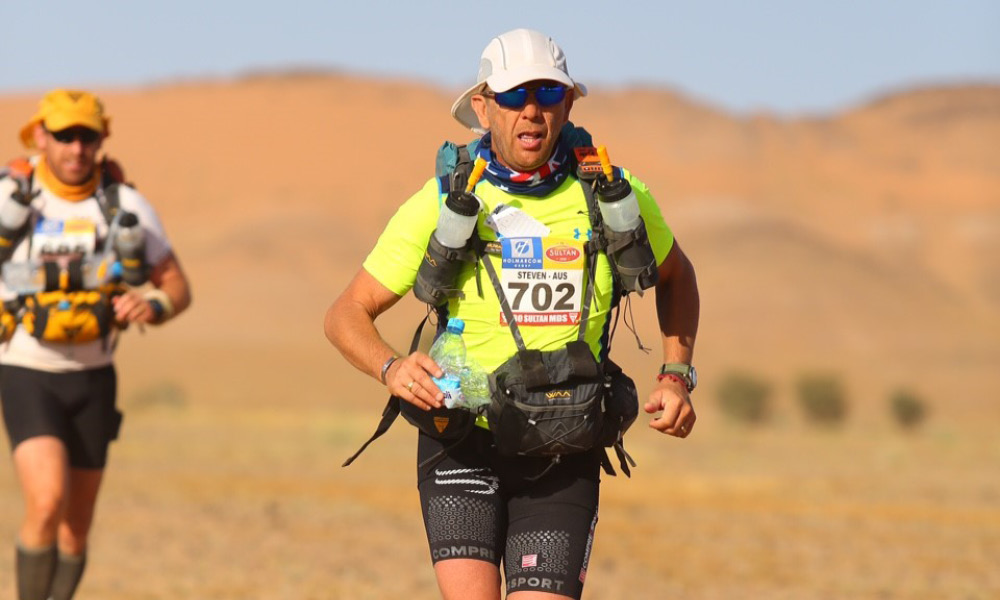In 2015, Judge Middleton of the Federal Circuit Court found himself keeping pace in a 251 km, 6-day ultra-marathon in the Sahara desert. An avid runner all his life, and having completed two Iron Man races prior, Judge Middleton has learned a lot from long-distance running, with the lessons forming his foundation of values on life in and outside the Court.
Within the profession, we view judiciary with the utmost formality and respect but behind the bench are real people made up of a kaleidoscope of interests, hobbies and personal values that define them as individuals. For Judge Middleton, his love for his family and his passion for long-distance running are the core drivers that make him the man he is today.
“I’ve always run. As a little kid, my dad was in the defence force, and he used to do training runs quite often, and when I could, I would toddle on behind him–of course, that was only four or five kilometres… Then in the 1990’s I started doing 10k events, and once I ran 10k, I thought, why not run a half marathon… and it just sort of grew from there,” Judge Middleton said.
“Like any other training, it’s just about working out what exactly you have to do. And once you get running fit, whether you run for 20 minutes or three hours, it [starts to] feel the same. I did most of my training on days when I didn’t have a brief (which was) one or two days a week, and then during the weekends [I ran] back to back half marathons,” he said.
“It’s just a matter of doing that training and getting your legs used to being really fatigued and then running on them.”
In 2015, Judge Middleton set his eyes on a challenge to reach a whole new level of physical fitness. The Marathon des Sables is regarded as one of the toughest foot races in the world. Spanning 6 days, the race is held in Morocco’s Sahara desert, with its length being the equivalent of running 9 full marathons. With the added challenge of blistering heat, runners must carry all of their gear on their back including food, water and gear for each leg of the race (the longest leg is 91km).
It takes a certain kind of person to train for an ultra-marathon while balancing the demands of a legal career and family commitments. When examining the picture as a whole, the intricacies involved with training for such a race seem impossible to reconcile–an act of madness. But for Judge Middleton, it is simply a matter of assessing immediate need and ticking through a checklist of what needs to be done to complete the task at hand. It is a philosophy that he has applied to his life and the things he loves within the workplace and outside the law.
We asked Judge Middleton to elaborate on his learnings in the desert.
“The number one thing was that everything got stripped away to the bare necessity. There were certain things I had to every day, and it was really simple… I had to drink my water, and I had to make sure I drank my water, and I had to take my salt tablets regularly–although they don’t recommend that anymore for long-distance–and I just basically partitioned the day of running,” he said.
“If I set off and said, I’m going to run 250km; I wouldn’t have made it. You’d go mad thinking about that–you couldn’t possibly do it. But if you set-off and say, I’m going to run until the next checkpoint, which was 7km, and then I’m going to reassess and run to the next checkpoint, it becomes really manageable. It’s a good lesson for your career and for everything.”
“It becomes a bit meditative, and there’s simplicity in that routine. I think about it all the time–people say we’re really seriously overworked and we’ve got massive dockets–everybody knows that. But you break it down to what have we got today, then break that down to what’s my first matter, what does that involve and how do I deal with it… it becomes really manageable because it’s like that phrase how do you eat an elephant? One bite at a time.”
Applying this methodology has kept Judge Middleton in good stead with his career and his family. A father of three and grandfather of two, he has been able to enjoy his career’s challenges and triumphs while prioritising the ones he loves most and is at the core of what he does. Judge Middleton says that without a coping strategy, the burden of this fine balance can quickly become too much.
“If you don’t have an outlet and a method, you will get burnt out and so easily overwhelmed.”
Upon Judge Middleton’s appointment as a Federal Court Judge on 24 November 2015, Peter Cummings SC welcomed the then newly appointed Judge, prophesizing that, “there may be days ahead when your Honour longs for the relative ease of the halfway mark in the Sahara! Though your Honour’s achievements are undoubtedly feats of endurance, they are also manifestations of discipline and focus on the task at hand1”.
When asked about the comparative challenge and resilience required for both ultra-marathon running and his work behind the bench, Judge Middleton’s empathetic realism shone through.
“Some of the stuff we have to deal with is tragic and laborious, [it’s] just horrible stuff. And while there are some days [where I think] you know, I’d love to be out there running, it’s fundamentally important to understand that while [long days in Court] may be difficult for me, those poor people [the litigants] in front of me [are enduring] their toughest day, during those trial or hearing days… I snap back pretty quick and think, if I think I’ve got it tough, look and these poor people [in front of me].”
“It’s a good lesson for lawyers too. Yes we have rough days, [sometimes] we have horrible days but we get paid fairly well, we have good work conditions for the most part and we get to go home to pretty well-functioning relationships. [The litigants] in family court [may not] have any of that”.
The intrigue of Judge Middleton is not only for his accomplishments in completing a massive feat of human endurance but also for his candid reflections on what it is like to be in a role such as his. The other side of this story is how members of the profession see the judiciary, and how opening up the conversation can combat feelings of isolation–an ongoing issue within the judicial community today.
“I was surprised how isolating it would be on the bench. Lawyers that I knew would literally cast their eyes down as I walked down the street… [They] just didn’t know how to respond. I still have people that I’ve known for years who don’t know how to speak with me in a public forum–which makes it awkward.”
“I think, for the profession if judges were more human, there would be a great benefit because we can help each other… I consider [the profession] a service industry, we’re all in it together,” Judge Middleton said.
When asked of his proudest moment, indicative of his character, Judge Middleton cast the light away from himself and praised each member of his family for their achievements.
“It all comes back to family. I accept that I have been able to achieve a few things but without my family’s support, I’d have a very different life”.
1 http://classic.austlii.edu.au/au/journals/NSWBarAssocNews/2015/60.pdf














Share this article